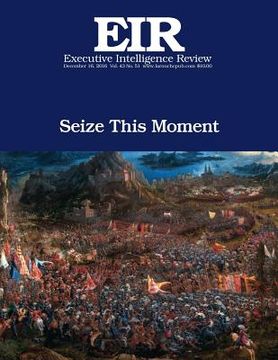Seize This Moment: Executive Intelligence Review; Volume 43, Issue 51 (in English)
Synopsis "Seize This Moment: Executive Intelligence Review; Volume 43, Issue 51 (in English)"
LaRouche's Fourth Law: Hamilton and Einstein by Philip Rubinstein What I want to do is to, in part, talk about this question of Lyndon LaRouche's Four Laws-really Hamilton, but also not just Hamilton, but rather Hamilton in the context of the Fourth of LaRouche's Laws. I'm going to read just a little bit of the Fourth Law, which is Lyndon LaRouche's expansion of Hamilton. We should be fairly clear on some things. Hamilton has a whole lot on the productivity of labor. In this sense, we will also discuss what LaRouche adds to the productivity of labor. Because what LaRouche cites as the fourth principle, the Fourth Law, is not simply in Hamilton. It goes further. Hamilton talks about the increase of the productivity of labor; of course his Report On Manufactures is a lengthy discourse on the importance of manufacturing from the standpoint of the improvement of the productivity of labor. Essentially, the reason he gives for manufacturing and the importance of manufacturing, the underlying principal, you could say, is the increase of the productivity of labor. Hamilton cites, through machinery for instance, "It is now proper to proceed a step further, and enumerate the principal circircumstances from which it may be inferred that manufacturing establishments not only occasion a positive augmentation of the produce and revenue of society, but that they contribute to rendering them greater than they could possibly be without such establishments." These circumstances are: (here's a shocker for you) the division of labor! I think a lot of people have a problem with that, that indeed the division of labor is an advantage in productivity, particularly if it's done properly. Secondly, the extension of the use of machinery-obviously the ability to expand labor, and as he goes on later, to expand the productivity of labor; the addition of a class of the community not normally engaged in productivity; the promotion of immigration from foreign countries; furnishing a greater scope for talents which discriminate men from each other; the affording of more ample and various fields for enterprise, and so on. The main point I want to make is that he started out with the division of labor and the extension of machinery. It's very clear otherwise that the point he makes about manufacturing, "the foregoing suggestions are not designed to inculcate an opinion that manufacturing industry is more productive than that of agriculture. They are intended rather to show that the reverse of the proposition is not ascertained." He says that people are saying that agriculture is productive and manufacturing is not. His argument is that manufacturing of course is indeed productive, and that, ultimately, it increases productivity, "and from these causes united the mere separation of that of the cultivator from that of the artificer has the effect of augmenting the productive powers of labor." The point is it augments the productive powers of labor. In a sense, that is the whole point of the longest of Hamilton's reports. The Report on Manufactures is far and away the longest one. The one point I want to make, a rather large point, before I cite one particular point from LaRouche, is, if you look at the Report on Public Credit, if you look at the Constitutionality of the National Bank, then, of course, there's the Report on the National Bank, they all have a certain principle which you find in the Federalist from the very beginning. This is why Hamilton is often accused of being an authoritarian, a monarchist, a totalitarian, because, in every one of these, he starts from the standpoint that the Union, as it's called later, during the Civil War, the nation as a whole, comes first. That comes before the states, in particular.

